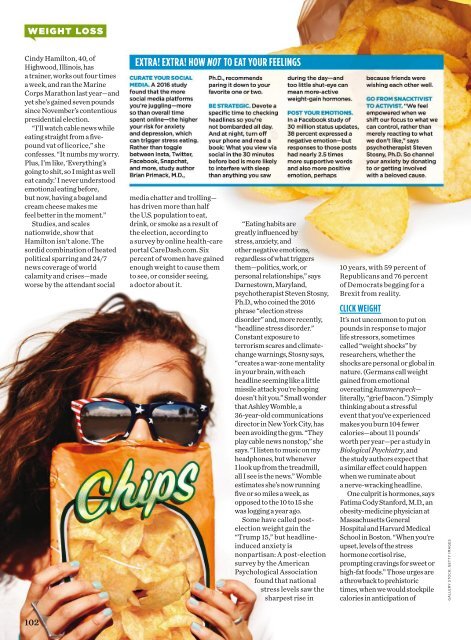Create successful ePaper yourself
Turn your PDF publications into a flip-book with our unique Google optimized e-Paper software.
WEIGHT LOSS<br />
Cindy Hamilton, 40, of<br />
Highwood, Illinois, has<br />
a trainer, works out four times<br />
a week, and ran the Marine<br />
Corps Marathon last year—and<br />
yet she’s gained seven pounds<br />
since November’s contentious<br />
presidential election.<br />
“I’ll watch cable news while<br />
eating straight from a fivepound<br />
vat of licorice,” she<br />
confesses. “It numbs my worry.<br />
Plus, I’m like, ‘Everything’s<br />
going to shit, so I might as well<br />
eat candy.’ I never understood<br />
emotional eating before,<br />
but now, having a bagel and<br />
cream cheese makes me<br />
feel better in the moment.”<br />
Studies, and scales<br />
nationwide, show that<br />
Hamilton isn’t alone. The<br />
sordid combination of heated<br />
political sparring and 24/7<br />
news coverage of world<br />
calamity and crises—made<br />
worse by the attendant social<br />
EXTRA! EXTRA! HOW NOT TO EAT YOUR FEELINGS<br />
media chatter and trolling—<br />
has driven more than half<br />
the U.S. population to eat,<br />
drink, or smoke as a result of<br />
the election, according to<br />
a survey by online health-care<br />
portal CareDash.com. Six<br />
percent of women have gained<br />
enough weight to cause them<br />
to see, or consider seeing,<br />
a doctor about it.<br />
“Eating habits are<br />
greatly influenced by<br />
stress, anxiety, and<br />
other negative emotions,<br />
regardless of what triggers<br />
them—politics, work, or<br />
personal relationships,” says<br />
Darnestown, Maryland,<br />
psychotherapist Steven Stosny,<br />
Ph.D., who coined the 2016<br />
phrase “election stress<br />
disorder” and, more recently,<br />
“headline stress disorder.”<br />
Constant exposure to<br />
terrorism scares and climatechange<br />
warnings, Stosny says,<br />
“creates a war-zone mentality<br />
in your brain, with each<br />
headline seeming like a little<br />
missile attack you’re hoping<br />
doesn’t hit you.” Small wonder<br />
that Ashley Womble, a<br />
36-year-old communications<br />
director in New York City, has<br />
been avoiding the gym. “They<br />
play cable news nonstop,” she<br />
says. “I listen to music on my<br />
headphones, but whenever<br />
I look up from the treadmill,<br />
all I see is the news.” Womble<br />
estimates she’s now running<br />
five or so miles a week, as<br />
opposed to the 10 to 15 she<br />
was logging a year ago.<br />
Some have called postelection<br />
weight gain the<br />
“Trump 15,” but headlineinduced<br />
anxiety is<br />
nonpartisan: A post-election<br />
survey by the American<br />
Psychological Association<br />
found that national<br />
stress levels saw the<br />
sharpest rise in<br />
10 years, with 59 percent of<br />
Republicans and 76 percent<br />
of Democrats begging for a<br />
Brexit from reality.<br />
CLICK WEIGHT<br />
It’s not uncommon to put on<br />
pounds in response to major<br />
life stressors, sometimes<br />
called “weight shocks” by<br />
researchers, whether the<br />
shocks are personal or global in<br />
nature. (Germans call weight<br />
gained from emotional<br />
overeating kummerspeck—<br />
literally, “grief bacon.”) Simply<br />
thinking about a stressful<br />
event that you’ve experienced<br />
makes you burn 104 fewer<br />
calories—about 11 pounds’<br />
worth per year—per a study in<br />
Biological Psychiatry, and<br />
the study authors expect that<br />
a similar effect could happen<br />
when we ruminate about<br />
a nerve-wracking headline.<br />
One culprit is hormones, says<br />
Fatima Cody Stanford, M.D., an<br />
obesity-medicine physician at<br />
Massachusetts General<br />
Hospital and Harvard Medical<br />
School in Boston. “When you’re<br />
upset, levels of the stress<br />
hormone cortisol rise,<br />
prompting cravings for sweet or<br />
high-fat foods.” Those urges are<br />
a throwback to prehistoric<br />
times, when we would stockpile<br />
calories in anticipation of<br />
GALLERY STOCK; GETTY IMAGES<br />
102

















